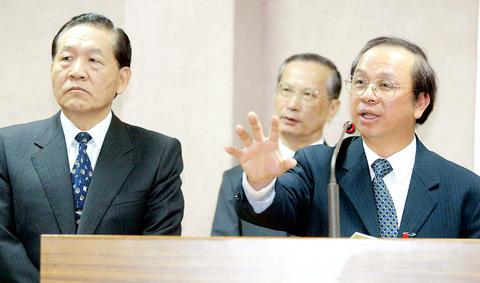The Industrial Development Bureau and the state-owned China Shipbuilding Corp (CSC) yesterday said that Taiwan is able to build submarines with a transfer of key US technology, but the Ministry of National Defense said the US would not help Taiwan do so.
But several legislators yesterday strongly criticized the government for "having no strategy" to promote the nation's submarine-building capability.
"Korea, Pakistan, Greece and Spain all built their own submarines, so why can't a technologically-advanced Taiwan do it too?" People First Party (PFP) Legislator Lin Yu-fang (

PHOTO: LIN CHENG-KUN, TAIPEI TIMES
"Taiwan's defenses have relied too much on the US, and the government has failed to enhance its defense industry," PFP Legislator Nelson Ku (
But bureau officials were more upbeat.
"A cross-ministry task force has reached the conclusion that the CSC is almost able to build submarines without large-scale investment in its shipbuilding equipment," Industrial Development Bureau director Chen Chao-yi (陳昭義) told the legislature. "However, the US' provision of submarine blueprints and submarine weapons systems are two prerequisites."
Chen said the task force requested that the defense ministry negotiate with the US over the purchase of eight submarines, in which Taiwan would send personnel to observe the building of two submarines in the US, then build one-third of the third and fourth submarines, two-thirds of the fifth and sixth submarines, and the seventh and eighth vessels in their entirety.
Fan Kuang-nan (范光男), acting chairman of the CSC, said that the company was looking forward to building submarines for the navy.
"The company has assessed that it only has to spend NT$1 billion on equipment to build the submarines," he said.
However, Vice Minister of National Defense Huo Shou-yeh (霍守業) said the US does not support the idea of US-Taiwan co-operation in submarine-building.
"The US has told the ministry on several occasions that it won't help Taiwan build submarines, and the ministry thinks the US has no financial interest in doing so," he said.

Taiwanese can file complaints with the Tourism Administration to report travel agencies if their activities caused termination of a person’s citizenship, Mainland Affairs Council Minister Chiu Chui-cheng (邱垂正) said yesterday, after a podcaster highlighted a case in which a person’s citizenship was canceled for receiving a single-use Chinese passport to enter Russia. The council is aware of incidents in which people who signed up through Chinese travel agencies for tours of Russia were told they could obtain Russian visas and fast-track border clearance, Chiu told reporters on the sidelines of an event in Taipei. However, the travel agencies actually applied

New measures aimed at making Taiwan more attractive to foreign professionals came into effect this month, the National Development Council said yesterday. Among the changes, international students at Taiwanese universities would be able to work in Taiwan without a work permit in the two years after they graduate, explainer materials provided by the council said. In addition, foreign nationals who graduated from one of the world’s top 200 universities within the past five years can also apply for a two-year open work permit. Previously, those graduates would have needed to apply for a work permit using point-based criteria or have a Taiwanese company

The Shilin District Prosecutors’ Office yesterday indicted two Taiwanese and issued a wanted notice for Pete Liu (劉作虎), founder of Shenzhen-based smartphone manufacturer OnePlus Technology Co (萬普拉斯科技), for allegedly contravening the Act Governing Relations Between the People of the Taiwan Area and the Mainland Area (臺灣地區與大陸地區人民關係條例) by poaching 70 engineers in Taiwan. Liu allegedly traveled to Taiwan at the end of 2014 and met with a Taiwanese man surnamed Lin (林) to discuss establishing a mobile software research and development (R&D) team in Taiwan, prosecutors said. Without approval from the government, Lin, following Liu’s instructions, recruited more than 70 software

Taiwanese singer Jay Chou (周杰倫) plans to take to the courts of the Australian Open for the first time as a competitor in the high-stakes 1 Point Slam. The Australian Open yesterday afternoon announced the news on its official Instagram account, welcoming Chou — who celebrates his 47th birthday on Sunday — to the star-studded lineup of the tournament’s signature warm-up event. “From being the King of Mandarin Pop filling stadiums with his music to being Kato from The Green Hornet and now shifting focus to being a dedicated tennis player — welcome @jaychou to the 1 Point Slam and #AusOpen,” the